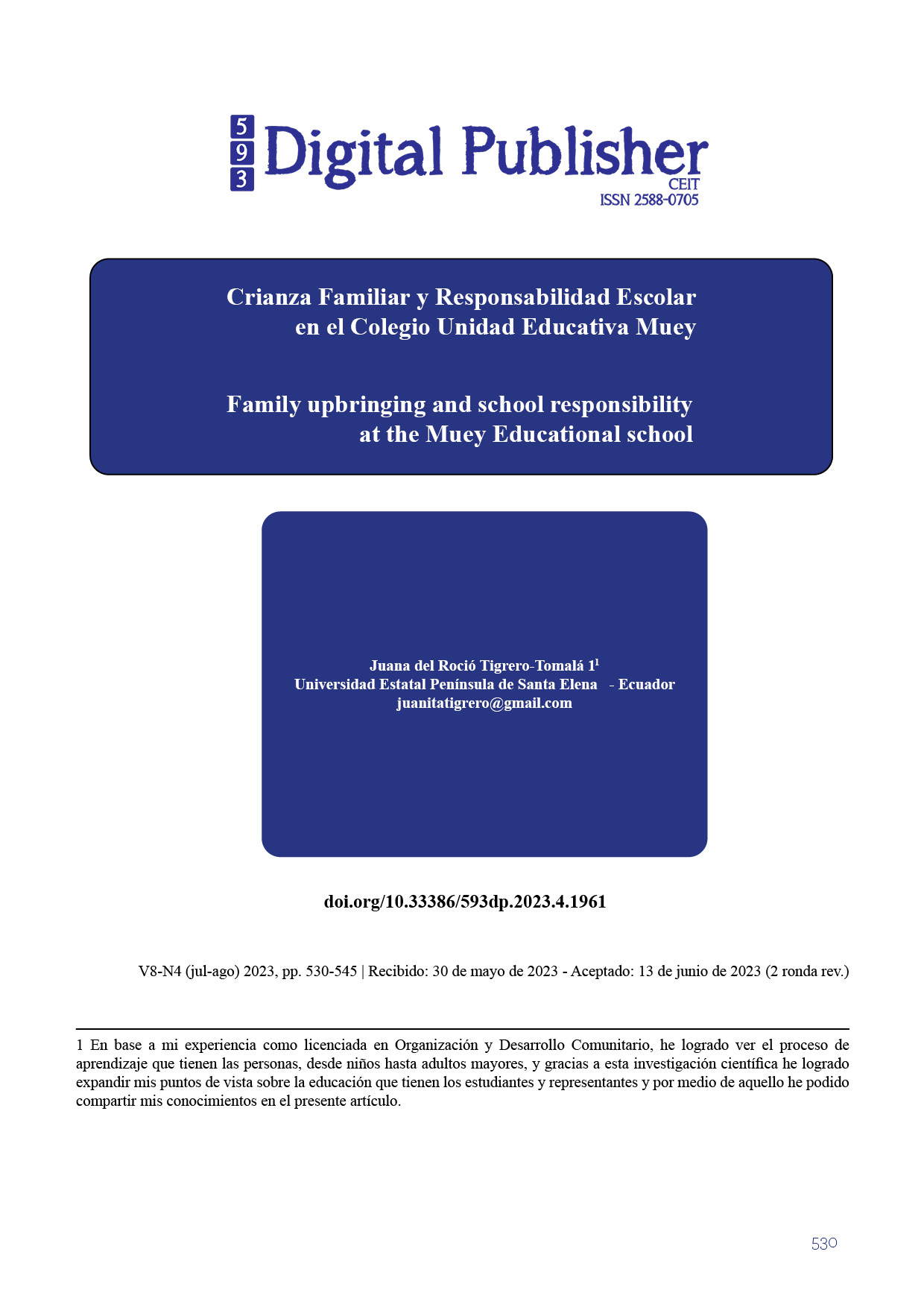Family upbringing and school responsibility at the Muey Educational school
Main Article Content
Abstract
The objective of our research is to make known the rate of students who have a bad relationship with their parents, since the lack of dialogue between parents and children is the main problem, since that is where they begin to have retaliation and part of the the education that exists within the home in other terms we know that communication is of vital priority for human relations, for this we will use the quantitative research method, since at the time of collecting the data, either through interviews or surveys it will be necessary to obtain the information that is of the utmost importance for our investigation, with the purpose of this long-awaited project is to help these young people who have had a bad education guide, it can lead to negative acts against themselves or with society . However, it should be clarified that when such inconveniences are discovered, solutions will be given that may be feasible for everyone, either through talks or school conferences, in which both parents and students can participate, thus preventing more problems from arising or coming from in some way or another.
Downloads
Article Details

This work is licensed under a Creative Commons Attribution-NonCommercial-ShareAlike 4.0 International License.
1. Derechos de autor
Las obras que se publican en 593 Digital Publisher CEIT están sujetas a los siguientes términos:
1.1. 593 Digital Publisher CEIT, conserva los derechos patrimoniales (copyright) de las obras publicadas, favorece y permite la reutilización de las mismas bajo la licencia Licencia Creative Commons 4.0 de Reconocimiento-NoComercial-CompartirIgual 4.0, por lo cual se pueden copiar, usar, difundir, transmitir y exponer públicamente, siempre que:
1.1.a. Se cite la autoría y fuente original de su publicación (revista, editorial, URL).
1.1.b. No se usen para fines comerciales u onerosos.
1.1.c. Se mencione la existencia y especificaciones de esta licencia de uso.
References
Alba Nidia Triana, L. Á. (24 de marzo de 2010). SciELO - Scientific Electronic Library Online. Obtenido de Patrones de crianza y cuidado de niños y niñas en Boyacá: http://www.scielo.org.co/scielo.php?script=sci_arttext&pid=S1692-715X2010000200012
Alvarado Calderón, K. (2012). EMPATÍA Y CLIMA FAMILIAR EN NIÑOS Y NIÑAS COSTARRICENSES DE EDAD ESCOLAR. "Actualidades Investigativas en Educación".
Castro Cabanillas, E. (12 de Febrero de 2020). Influencia de la familia y el ambiente social/ cultural en el aprendizaje temprano. Obtenido de https://repositorio.une.edu.pe/bitstream/handle/20.500.14039/5916/MONOGRAF%c3%8dA%20-%20CASTRO%20CABANILLAS%20ERLITA%20-%20FEI.pdf?sequence=1&isAllowed=y
Cline, V. (1998). Formar hijos exitosos. El nuevo papel de los padres en la formación de los hijos. . México: Selector.
Costa, X. (2014). LOS TRASTORNOS DE CONDUCTA EN LA ADOLESCENCIA. Obtenido de https://www.fundacioorienta.com/es/los-trastornos-de-conducta-en-la-adolescencia/
Doherty, W. K. (1998). Responsible fathering: An overview and a conceptual framework. Journal of Marriage and the family.
GUTIÉRREZ DE PINEDA Virginia y VILA de PINEDA, P. (1988). Honor, familia y sociedad. Bogotá: Centro Editorial Universidad Nacional de Colombia.
JARA, L. E. (24 de Mayo de 2013). ¿QUÉ SE ESPERA DE UN PROYECTO DE INVESTIGACIÓN? TECNO ESUFA.
LA CASA, P. (2001). Entorno familiar y educación escolar: la intersección de dos escenarios educativos. Madrid, España: Alianza Editorial.
Laura Evelia Torres Velázquez, A. G. (2008). Responsabilidades en la crianza de los hijos. Enseñanza e Investigación en Psicología, 77-89.
Levy, S. (Julio de 2022). Problemas de comportamiento en los adolescentes. Obtenido de MANUAL MSD Versión para público general: https://www.msdmanuals.com/es-es/professional/pediatr%C3%ADa/los-problemas-en-la-adolescencia/problemas-de-conducta-en-los-adolescentes?query=Problemas%20de%20comportamiento%20en%20los%20adolescentes
Martinez, Á. C. (10 de julio de 2009). SciELO - Scientific Electronic Library Online. Obtenido de Pautas de crianza y desarrollo socioafectivo en la infancia: http://www.scielo.org.co/scielo.php?script=sci_arttext&pid=s1794-99982010000100009
Moreno Ruiz, D., Estévez López, E., Murgui Pérez, S., & Musitu Ochoa, G. (2009). Relación entre el clima familiar y el clima escolar: el rol de la empatía, la actitud hacia la autoridad y la conducta violenta en la adolescencia. International Journal of Psychology and Psychological Therapy.
Pérez, M. (28 de Julio de 2021). Definición de Metodología. Obtenido de Concepto de Definición: https://conceptodefinicion.de/metodologia/
Quero, F. d. (2000). Hombres sin temor al cambio.
Sánchez Acero, M. (27 de Julio de 2015). UNIVERSIDAD LIBRE. Los estilos de crianza de las familias como estrategia de apoyo en el desempeño escolar de los estudiantes del ciclo II del I.E.D Restrepo Millán Sede B. Bogotá, Colombia .
Seidler, V. (2000). La sinrazón masculina. México: Programa Universitario de Estudios de Género / Centro de Investigaciones y Estudios Superiores en Antro pología Social/Paidós. .
Sordo, S. Á. (30 de Septiembre de 2021). ¿Sabes por qué es tan malo educar desde el miedo? Obtenido de https://es.linkedin.com/: https://es.linkedin.com/pulse/sabes-por-qu%C3%A9-es-tan-malo-educar-desde-el-miedo-%C3%A1lava-sordo-ph-d
Susana Menéndez, L. J. (s.f.). Familia y adaptación escolar durante la infancia. España: Universidad de Huelva y Sevilla.
Violeta Arancibia., P. H. (2001). Psicología de la educación.


